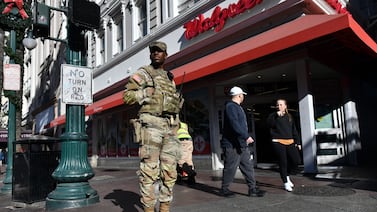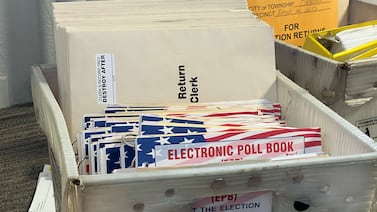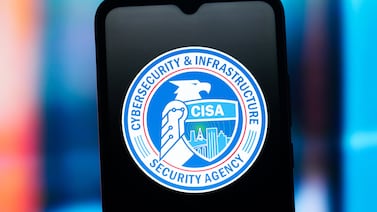Votebeat is a nonprofit news organization reporting on voting access and election administration across the U.S. Sign up for Votebeat Wisconsin’s free newsletter here.
Update, Nov. 10: A state appeals court rejected the Wisconsin Elections Commission’s appeal of a Waukesha County judge’s order requiring election officials to verify voters’ citizenship. The judge had already halted enforcement of his own order, so for now, election officials still don’t have to check whether voters are U.S. citizens.
The Wisconsin Elections Commission on Friday appealed a Waukesha County judge’s order requiring election officials to verify the citizenship of all registered voters and people seeking to register.
Attorneys for the Wisconsin Department of Justice wrote that the Waukesha County Circuit Court decision was “impermissively vague” and would require election officials to disregard multiple voter registration laws.
The appeal follows a request for a stay, filed last week, in which the attorneys told the court it would be virtually impossible for the election commission to implement Judge Michael Maxwell’s decision by the February statewide election, and that it would illegally have to shut down online voter registration in the meantime.
In response, Maxwell stayed the part of his ruling that required citizenship verification for new registrants, but let stand the part requiring the Wisconsin Elections Commission to verify the citizenship of all currently registered voters.
Maxwell’s ruling did not specify how the commission should go about verifying the citizenship of registered voters: whether it should check them against other databases, confirm that they properly attested under oath to their citizenship when they registered, or demand documentary proof from registered voters, as some other states now require.
The case has further escalated a political debate in Wisconsin over how to ensure that only citizens can vote. Last fall, Wisconsin voters overwhelmingly approved a constitutional amendment to ban voting by noncitizens across the state, and other states enacted similar bans.
Across the country, Republicans have also been pushing for laws requiring documentary proof of citizenship to register to vote, on the grounds that they’re needed to prevent noncitizen voting.
But there’s no evidence of widespread voting by noncitizens, and a Votebeat analysis and other studies have shown that such requirements can disenfranchise eligible U.S. citizens.
Wisconsin has lagged behind other states in seeking such measures through legislation, but the case in Maxwell’s Waukesha County court has sped up bill writing on the issue. Since his early October court ruling, Republicans have introduced a bill requiring an audit of potential noncitizens on the voter rolls, and directing election officials to compare those rolls against state and federal citizenship data, and they have raised the issue in political campaigns.
When Democratic Attorney General Josh Kaul, who’s seeking reelection, filed a motion for a stay on Maxwell’s decision, Republican U.S. Rep. Tom Tiffany — now running for governor — accused Democrats on social media of wanting “illegal aliens voting.”
That talking point has dominated conservative talk radio, while Democrats have stayed mostly quiet outside court filings.
How the state has responded to the lawsuit
The lawsuit in Maxwell’s court, filed last year by a Pewaukee resident represented by conservative attorneys, seeks to require citizenship verification checks of all new registrants and to require the Wisconsin Department of Transportation to provide the Wisconsin Elections Commission with its data on citizenship so that it can compare them against the voter roll.
Maxwell ruled Oct. 3 that the election commission was failing to ensure only lawful voters remained on the rolls, citing statutes limiting voting to citizens. He ordered the agency to check for noncitizens by February, but didn’t specify how, other than suggesting a match with DOT data, as the plaintiffs demand.
The election commission has told the court that there’s no state law requiring documentary proof of citizenship.
Kaul, the attorney general, has argued in court that launching a citizenship verification program before next year’s elections would be unfeasible, and that relying on DOT data that may be inaccurate could wrongly disenfranchise newly naturalized citizens. In the appeal, Justice Department attorneys said Maxwell’s ruling could disenfranchise eligible voters unable to meet Maxwell’s “undefined verification criteria” and lead Wisconsin’s 1,850 clerks to apply inconsistent standards.
Bryna Godar, a staff attorney at the University of Wisconsin Law School’s State Democracy Research Initiative, said Maxwell’s decision conflicts with Wisconsin election law, which calls for requiring proof of certain qualifications to vote, like residence, but not others, including citizenship, competence, or clean criminal record.
Existing laws already deter noncitizens from voting, Godar argued. “Noncitizens who register to vote face criminal liability under state law,” he said, “and if they vote, it also renders them permanently inadmissible under federal immigration law, which means deportation and other immigration consequences.”
Flawed tools for citizenship verification
There’s no standardized method used in states that require or retroactively check for proof of citizenship, but two methods have been recommended for Wisconsin for already registered voters.
The first is to check the voter rolls against citizenship records held by other state agencies, such as driver’s license information, as the plaintiffs in the Waukesha County case have suggested.
But the state Department of Transportation has told the court that its citizenship data can be inaccurate and outdated.The department records applicants’ citizenship status based on their proof of citizenship or legal residence at the time the license is issued. Those cards typically remain valid for eight years, and current state law doesn’t require applicants to update their citizenship status with the department if it changes during that time.
Because many people become U.S. citizens well before their licenses expire, the department’s data can quickly become outdated — a problem that grows as the number of naturalizations spikes ahead of major elections, a Wisconsin Department of Justice official said in a court hearing last October.
Another method that some states use — and that conservative legal groups such as the Wisconsin Institute for Law & Liberty recommend — is to use the U.S. Citizenship and Immigration Services’ SAVE program. SAVE is a search tool designed for states to check whether their residents qualify for certain public-benefit programs, but the Trump administration has encouraged states to use it for checking voter rolls as well.
But its data can also be incomplete and outdated, according to an analysis by the Brennan Center for Justice, which found it should be “considered useful, but not definitive” for citizenship verification.
Jasleen Singh, counsel for the Brennan Center’s voting rights program, told Votebeat the SAVE database includes only immigrants known to the U.S. government. Undocumented immigrants who haven’t interacted with federal agencies wouldn’t appear, and citizens born before 1978 may also be missing, since the Social Security Administration didn’t collect citizenship data until then.
What citizenship checks in other states have turned up
Louisiana ran its voter rolls through the SAVE program this year as part of an investigation into noncitizen voters. It found 390 potential noncitizens in records going back to the 1980s, including 79 people who voted at least once in that period. That’s a minuscule share of Louisiana’s registered voters.
Democrats say these figures show noncitizen voting is rare enough that it doesn’t need a blunt legislative solution that could disenfranchise anyone. But Republicans argue that even a single illegally cast ballot undermines election integrity.
In Arizona, those who haven’t shown proof of citizenship can vote only in federal elections. About 35,000 people as of last December, or just under 1% of the state’s voters, are on this “federal only” voter roll. A Votebeat analysis found these voters are concentrated on Native land, college campuses, and near the state’s main homeless campus; they tend to be younger, and vote at lower rates.
In Texas, about 1% of the voting-age population lacks proof of citizenship and another 6% would struggle to locate it, according to a University of Maryland study, which found Black, Latino, young, and Republican voters are particularly likely to face those challenges.
The Wisconsin Institute for Law & Liberty has proposed a multistep noncitizen audit — including matching voter rolls against DOT data as well as the SAVE database, checking for discrepancies, and then providing time for flagged voters to provide citizenship proof. Republican state Rep. Scott Krug, a Republican, introduced a proposal this month requiring a noncitizen audit that follows these steps.
Mequon City Clerk Caroline Fuchs already follows a similar process, using the DOT database to check registrants’ citizenship and sending flagged names to a U.S. Department of Homeland Security contact. She said the agent found about a dozen voters incorrectly marked as noncitizens in the DOT database, but none of those identified by DHS disputed the finding.
Fuchs told Votebeat in early October that she was pleased to see the Waukesha County judge’s order, but said she and other clerks weren’t rushing to implement it since they knew it would be appealed.
Alexander Shur is a reporter for Votebeat based in Wisconsin. Contact Alexander at ashur@votebeat.org.




